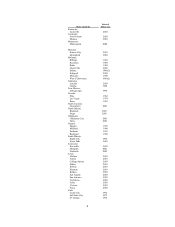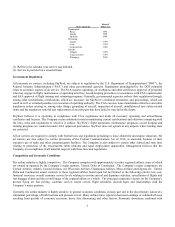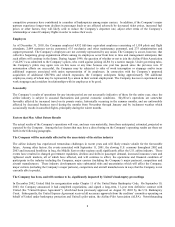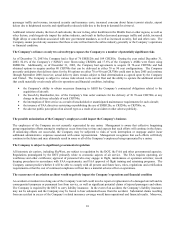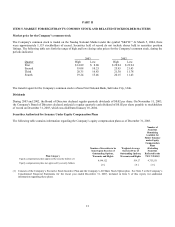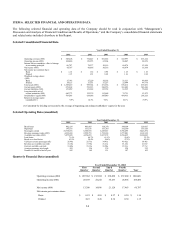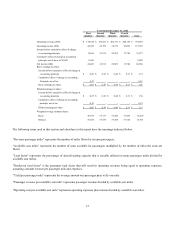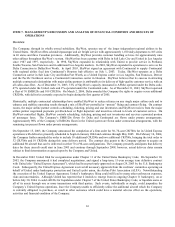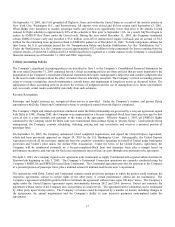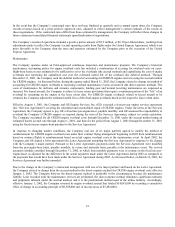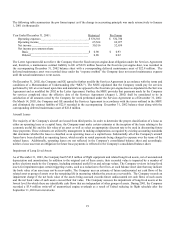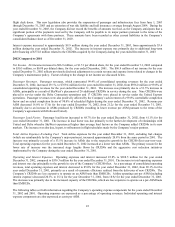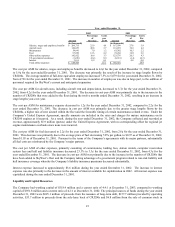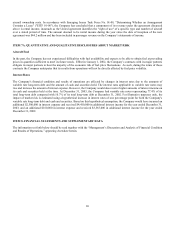SkyWest Airlines 2003 Annual Report Download - page 19
Download and view the complete annual report
Please find page 19 of the 2003 SkyWest Airlines annual report below. You can navigate through the pages in the report by either clicking on the pages listed below, or by using the keyword search tool below to find specific information within the annual report.ITEM 7. MANAGEMENT’S DISCUSSION AND ANALYSIS OF FINANCIAL CONDITION AND RESULTS OF
OPERATIONS
Overview
The Company, through its wholly owned subsidiary, SkyWest, operates one of the larger independent regional airlines in the
United States. SkyWest offers scheduled passenger and air freight service with approximately 1,100 daily departures to 105 cities
in 26 states and three Canadian provinces. Additionally, SkyWest provides customer handling services for approximately nine
other airlines throughout SkyWest’s system. SkyWest has been a partner with Delta in Salt Lake City and United in Los Angeles
since 1987 and 1997, respectively. In 1998, SkyWest expanded its relationship with United to provide service in Portland,
Seattle/Tacoma, San Francisco and in additional Los Angeles markets. In 2001, SkyWest expanded its operations to serve as the
Delta Connection in Dallas/Fort Worth. In April 2003, SkyWest signed an agreement with Continental to supply Continental
with regional airline feed into Continental’s Houston hub effective on July 1, 2003. Today, SkyWest operates as a Delta
Connection carrier in Salt Lake City and Dallas/Fort Worth, as a United Express carrier in Los Angeles, San Francisco, Denver
and the Pacific Northwest and as a Continental Connection carrier in Houston. SkyWest believes that its success in attracting
multiple contractual relationships with major airline partners is attributable to its delivery of high-quality customer service with an
all cabin-class fleet. As of December 31, 2003, 51% of SkyWest’s capacity (measured in ASMs) operated under the Delta code,
47% operated under the United code and 2% operated under the Continental code. As of December 31, 2003, SkyWest operated
a fleet of 76 EMB120s and 109 CRJ200s. On March 2, 2004, Delta awarded the Company the rights to acquire seven additional
CRJ200s, with deliveries currently expected to begin during the first quarter of 2005.
Historically, multiple contractual relationships have enabled SkyWest to reduce reliance on any single major airline code and to
enhance and stabilize operating results through a mix of SkyWest-controlled or “prorate” flying and contract flying. On contract
routes, the major airline partner controls scheduling, ticketing, pricing and seat inventories and SkyWest receives from the major
airline partner negotiated payments per-block-hour or flight departure and incentives related to levels of customer service. On
SkyWest-controlled flights, SkyWest controls scheduling, ticketing, pricing and seat inventories and receives a prorated portion
of passenger fares. The Company’s EMB120s flown for Delta and Continental are flown under prorate arrangements.
Approximately 90% of the Company’s EMB120s flown in the United system are flown under contractual arrangements, with the
remaining ten percent flown under prorate arrangements.
On September 15, 2003, the Company announced the completion of a firm order for 30, 70-seat CRJ700s for its United Express
operations with deliveries presently scheduled to begin in January 2004 and continue through May 2005. On February 10, 2004,
the Company further amended the order to include 10 additional CRJ200s and two additional CRJ700s, bringing the total order to
32 CRJ700s and 10 CRJ200s during this same delivery period. The contract also grants to the Company options to acquire an
additional 80 aircraft that can be delivered in either 70 or 90-seat configurations. The Company presently anticipates that delivery
dates for these aircraft could start in June 2005 and continue through September 2008; however, actual delivery dates remain
subject to final determination as agreed upon by the Company and United.
In December 2002, United filed for reorganization under Chapter 11 of the United States Bankruptcy Code. On September 10,
2003, the Company announced it had completed negotiations, and signed a long-term, 11-year average term definitive contract
with United (the “United Express Agreement”), which had been previously approved on August 29, 2003 by the U.S. Bankruptcy
Court. Subsequently, the United Express Agreement received all necessary approvals from the creditors’ committee operating on
behalf of United under bankruptcy protection and United’s pilot union, the Airline Pilot Association (ALPA). Notwithstanding
the execution of the United Express Agreement, United’s bankruptcy filing could still lead to many other unforeseen expenses,
risks and uncertainties. Although United has reported that it intends to emerge from its ongoing Chapter 11 bankruptcy, on or
before July 30, 2004, it could still file for liquidation under Chapter 7 of the United States Bankruptcy Code, or liquidate some or
all of its assets through one or more transactions with third parties. Such events, individually or singly, could jeopardize the
Company’s United Express operations, leave the Company unable to efficiently utilize the additional aircraft which the Company
is currently obligated to purchase, or result in other outcomes which could have a material adverse effect on the operations,
activities and financial condition of the Company.
16


